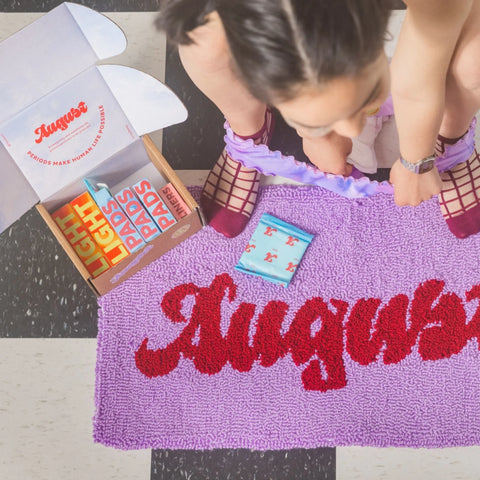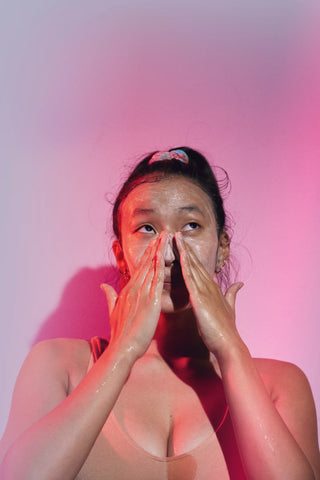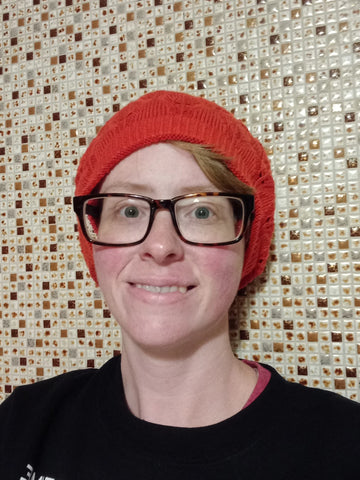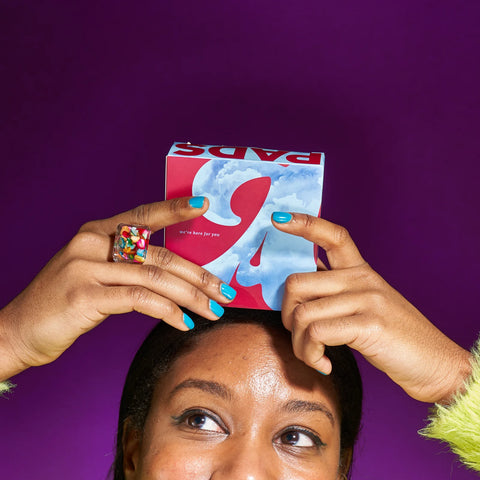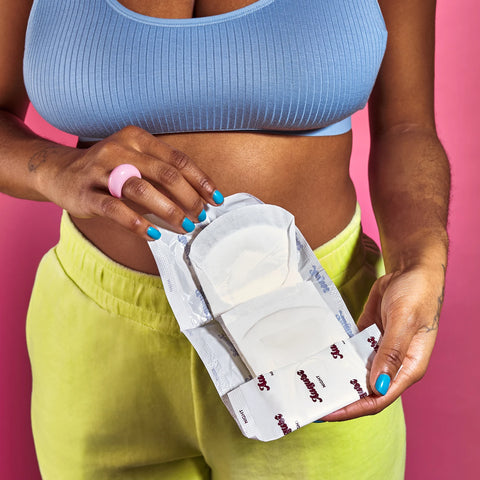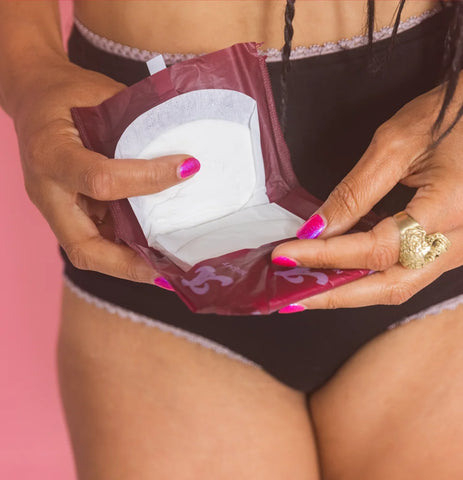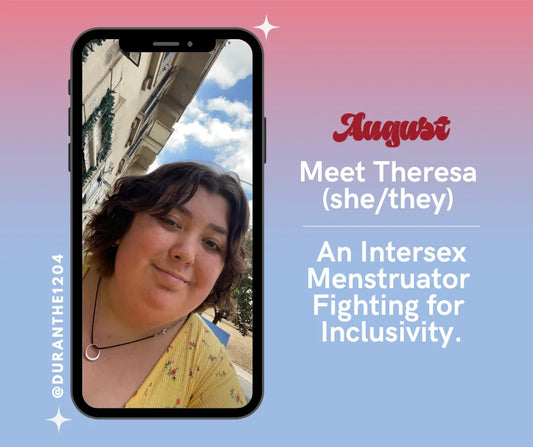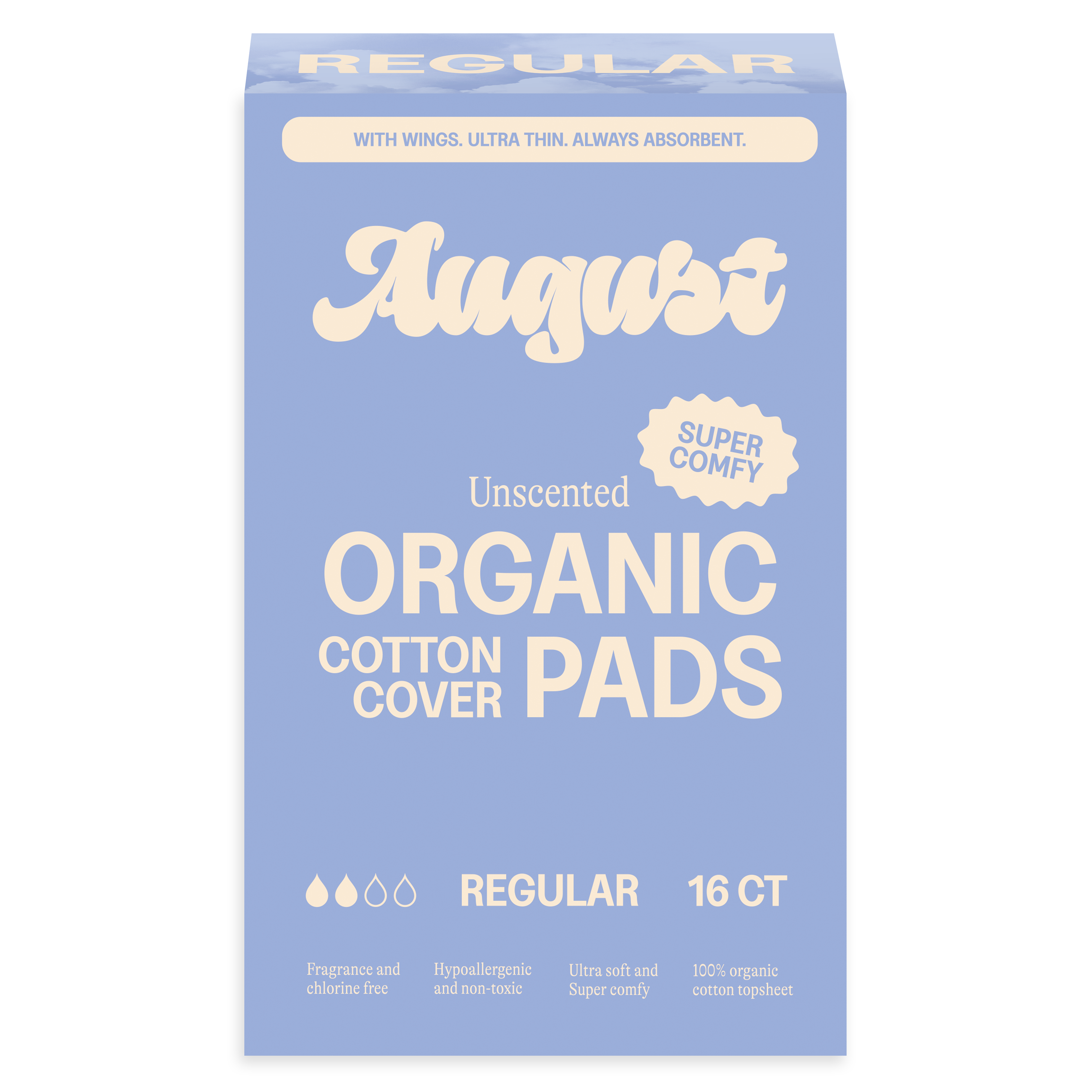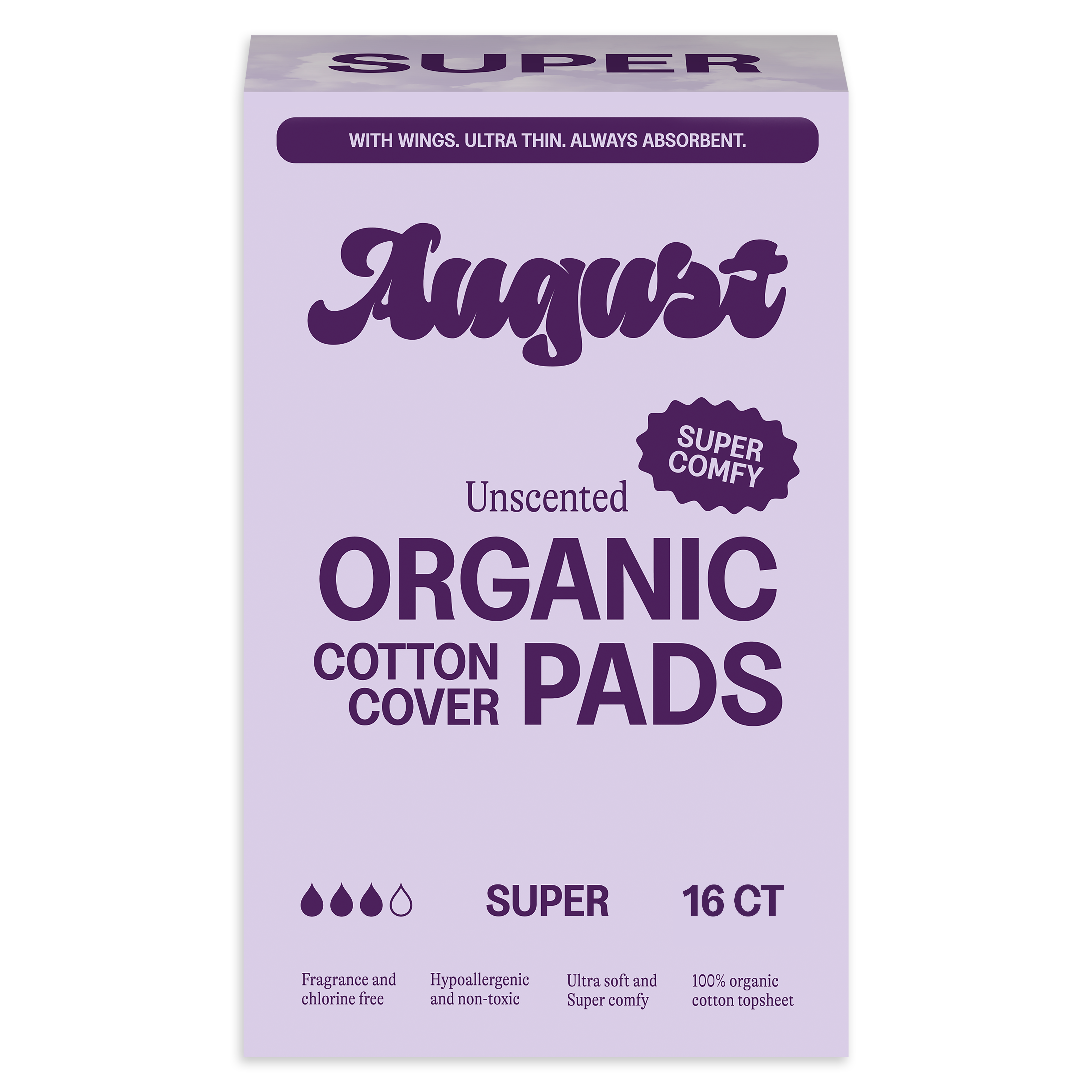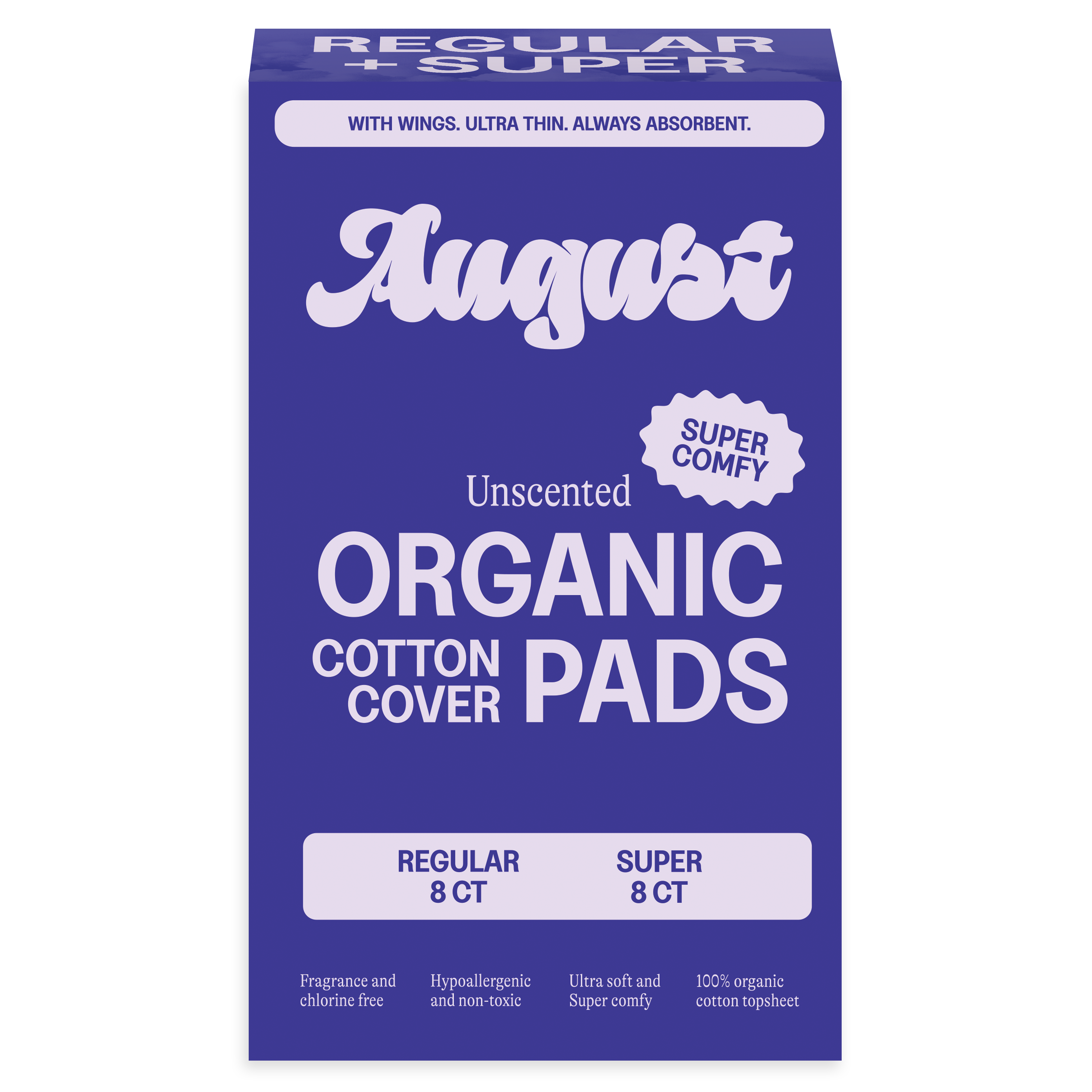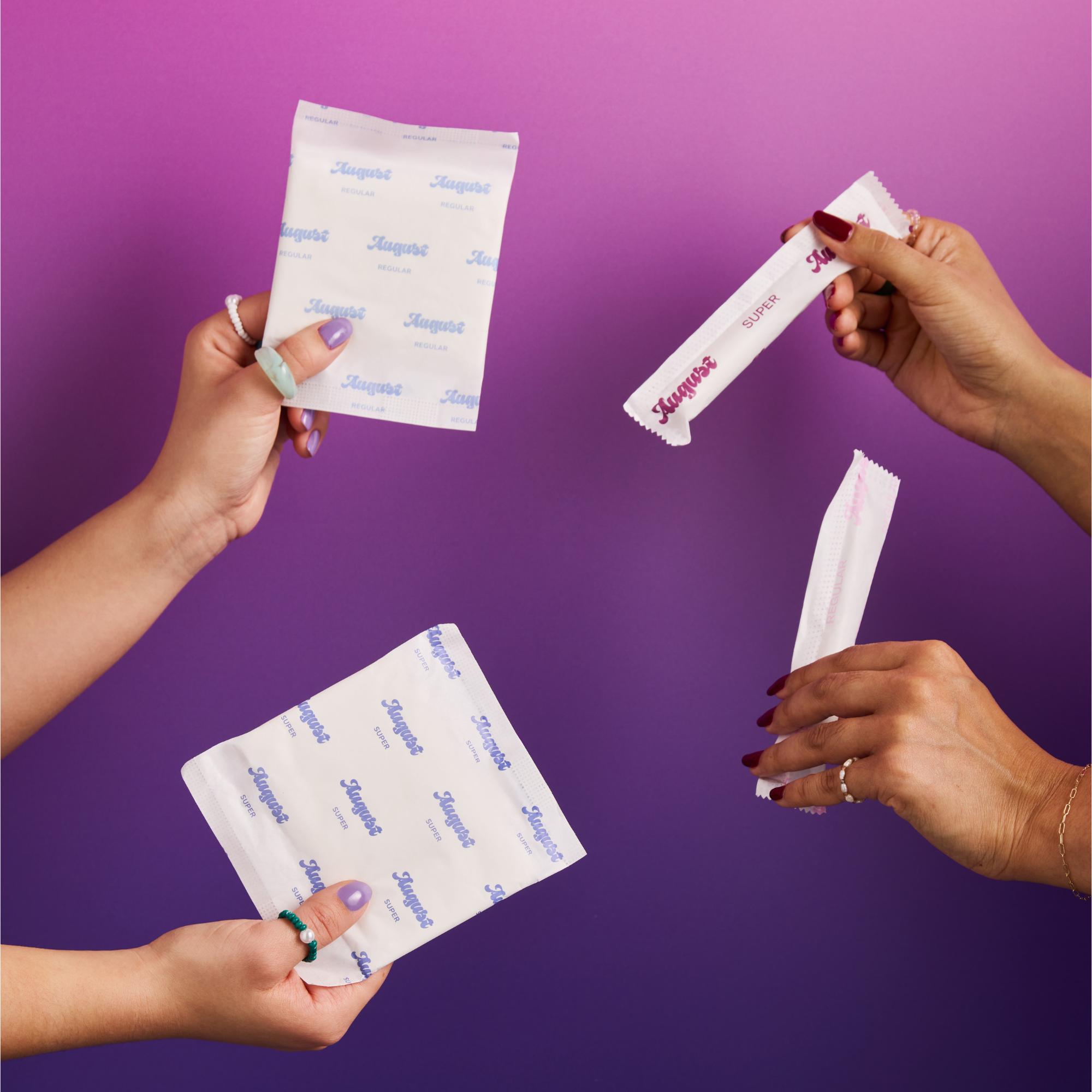Brain fog, taboo, self-esteem: How this menstruator sees similarities between ADHD and her period
Jenna Curia is a member of August’s Inner Cycle community. She has a period, and also navigates the world with ADHD Combined-Type (aka Attention Deficit Hyperactivity Disorder with inattentive and hyperactive qualities).
Jenna kindly shared her experience about how her menstrual cycle and ADHD intersect. She details her transition from hyperactive-athlete to burnt-out-academic, explains how she decided to seek out diagnosis, breaks down strategies that work for her ADHD x period symptoms, and reveals her secret to being confident in talking about both taboo topics.
Introduce yourself! Who are you & what do you do?

Hi, I’m Jenna! I’m 22 years old, and I live in Raleigh, NC. I studied psychology and biology at a liberal arts college while also conducting undergraduate research and earning my EMT certification.
I’m excited to begin a career in trauma-informed public care with an interdisciplinary approach. I’m passionate about looking at situations as multi-dimensional combinations of physiological, psychological, socioemotional, and epigenetic factors (just to name a few!), and carrying this mindset into the workforce feels really energizing to me. This mode of thinking is what makes me so passionate about the interconnection between ADHD, the menstrual cycle, and the societal stigma imposed on both of those amazing processes, which is what we’re here to discuss today!
Outside of academics, I’m an athlete, a writer, a (soon to be) #coolaunt, and a proud menstruator with ADHD.
When did you get your first period?

I got my first period in the summertime when I was 13-years-old. I started menstruating later than the people around me and, as a late bloomer in general, I was feeling immature and left out. Getting my period was the self-esteem boost that I needed to finally feel like I was on track.
I first learned about menstruation as a biological process in fifth grade. My teacher sent the boys across the hall and told the girls that if we started menstruating at school, our secret code word was “I need a pink post-it.” If we walked up to her desk and whispered that phrase, she would give us a Ziploc bag with pads and liners and chocolate, no questions asked.
It felt like a secret club for the elite, so obviously I was desperate to use that code. I started checking my underwear for hopeful blood every time I used the bathroom at school without success. Eventually the school year ended, and all I got was a gendered, stigmatized impression of menstruation and a lot of disappointment over, so far, missing out on that milestone.
It turns out that I still had about three years to go until I joined the “pink post-it” club, long after the hype had passed.
What was your introduction to period products?

I’d spent years since that homeroom lecture listening to my friends talk about menstruation and watching them hand each other tampons before soccer games. It all seemed so exclusive and exciting (aka pink-post-it envy).
I’ve been an athlete my whole life, and my period was remarkably light until I got to college. I used liners during my first few years of menstruation, with the exception of tampons for sports practices or games.
When I got my first box of tampons, I sprinted to the bathroom, locked the door, and read the instruction manual for what felt like a very long time. One by one, I used almost every tampon trying to figure out how to insert them. When I finally managed to place one in about halfway, I had already lost the focus to keep trying and was running late to swim.
I changed into my Speedo and told myself that periods were supposed to be uncomfortable, so that must mean I was doing something right. I waddled to the pool feeling satisfied with my work and wondering if the cars passing by could tell that I looked older.
It wasn’t long before I came to understand that tampons expand upon absorption. I jumped out of the water and wrapped my towel around my waist, trying desperately to hold that tampon in, and I complained of a stomach ache so that I could go home early.
Now, aside from being someone with a period, you’re also diagnosed with ADHD. What was ADHD like as a child and teenager? Did you know you had ADHD?

Now that I have so much information about my brain and my body, I can look back and recognize how ADHD symptomatically presented itself in my childhood and adolescence. It still shocks me that I wasn’t diagnosed until college because it seems so obvious now!
As a kid, I had endless energy. I developed a reliance on the routine and exhaustion of sports to keep me focused and grounded, but I didn’t have the insight to know that and the adults in my life just thought I was having fun.
Even though I was deemed as “gifted” in school, it felt like my performance never reached full potential, and was often labeled as hyper, annoying, stubborn, and careless. I didn’t have the vocabulary to express my feelings at the time, but now I can identify a lot of defeat and shame as I overexerted myself to keep up while being told that I needed to try harder.
How did your feelings of self-doubt from ADHD overlap with having a period?

I noticed that these low mental health feelings escalated during the week leading up to my period, which made those times harder to mask. I assumed that I had to figure out why I felt so lonely and frustrated and would break down over both the big and small things. No one in my life really talked openly about periods at this point, and I remember feeling isolated.
On the morning of my ACT exam, I woke up with my period. I was stressed out about doing well since it felt like my entire future depended on it, so I stayed up late to cram the night before (not knowing any better strategies). At 6:30 AM I was already achy, groggy, and losing track of time. The compounded stress was quickly draining whatever energy I had, and in my rush to leave on time, I forgot to pack period products for the day.
I made it through my morning exams and on the first break of the day, I walked to the bathroom to learn that blood had leaked onto my jeans. I cleaned up what I could, shoved wadded up toilet paper into my underwear and walked back to the classroom to finish my test.
At the end of the day, I fell into total brain fog. I sat in my car and cried, feeling like a total failure after exerting so much energy just to show up on time.
(For the record, I never even looked at my ACT scores after they came in. I didn’t want to know. I submitted them with my college applications and got in, so I guess they were fine and that’s good enough for me!)
At the time, I didn’t know that focus and short term memory are impacted by ADHD, and these symptoms are exacerbated by menstrual hormones. Even though I tracked my period and my cycle was predictable, I would routinely forget to buy period products, stock my backpack, or even change the products I was wearing frequently enough, and this led to a lot of guilt and shame that I thought was my own fault. All of that created a perfect storm that day.
When did you start considering you might have ADHD?
I knew what ADHD was in a general sense, but the possibility of my own ADHD diagnosis wasn’t even on my radar until college. When I moved into my freshman dorm, I reduced my athletic commitments to take on rigorous academic and research schedules. This was college, and I was determined not to let my family or professors down.
I started considering that I might have ADHD when my plan to hyperfocus on academics and eliminate ‘distractions’ like athletics went poorly. Being without demanding physical movement for the first time in my life was draining my focus instead of boosting it. Despite the longer blocks of study time that my new schedule allowed, I just couldn’t make myself sit for that long.
As an underclassman in a research lab, I was struggling to keep my head above water. Finally, an upperclassman in my lab reached out to get coffee. Instead of shaming me for falling behind, they asked how they could help. I was shocked.
Together, we created a plan. They introduced tools to help me stay organized, and I quickly caught up in classes and research with the support of a few peers.
Since I had learned to mask a lot of my symptoms with achievement where I could, I think I slid under the radar for quite some time. I’ve since learned that this is common in females assigned at birth with ADHD diagnoses.
Soon after that upperclassman conversation, I started making more friends. I connected best with the people who had similarities in terms of study habits, lifestyle, and emotional intelligence.
One of them opened up about having ADHD, and then another, and that’s what led me to explore the diagnosis for myself. I started having conversations about ADHD, reading about symptoms that impact school performance, and trying out some time management strategies for neurodiverse individuals. When those coping tools started improving my college experience, that’s when I felt like I needed to get an official diagnosis.
How did the combination of having a period and ADHD affect your routine activities? How do you manage the crossover moments?

ADHD impacts nearly every aspect of my life.
I’ve found that my response to deadlines and expectations is to increase my own standards of productivity, which leads to low self-esteem, anxiety and burnout. These feelings are only exacerbated by the hormonal fluctuations that occur before and during menstruation.
Forgetfulness and difficulty concentrating really impact my daily life, especially on my period, so I alter my routine during times that feel more symptomatic. To feel grounded and productive as much as possible, I use a sliding scale of repeated reminders (visual and auditory) and positive reinforcements (if I work for X amount of time, I will read a novel for X amount of minutes).
I also adjust the types of foods I eat and how often I choose to eat them (think frequent, small meals with lots of omega-3 and iron), and I try to adjust my schedule to accommodate extra REM sleep. Also, I lean on cardio exercise to give me the endorphins I need to concentrate, and in order to preserve physical energy while feeding myself brain power, I incorporate more active rest like yoga, barre, and gentle swim when I’m on my period.
Another coping tool that I received after an official ADHD diagnosis is stimulant medication. Although there are many types, I take long-acting Ritalin which has transformed my day-to-day productivity levels and mood regulation.
Something really interesting about periods is that higher levels of estrogen and progesterone, the hormones that increase right before menstruation, can actually make ADHD medication less effective. So for about 3-5 days per month, even my greatest coping efforts fail and I can end up crying, missing deadlines, and trying to find the hormonal balance I need from exercise, nutrition, and rest alone.
In addition, I track my period to anticipate when those 3-5 days are going to take place, and when I know to expect them, I move deadlines, try not to make big plans, and even request time-off to reduce my expectations of myself. Shedding uterine lining every month is hard work in itself; I don’t need to feel like a failure for forgetting a dentist appointment on top of that!
What strategies do you now have in place to cope with the times of month when ADHD and period symptoms are overlapping?
ADHD is not something that is “cured” (because it doesn’t need to be!) but it requires a different approach to life. I think these strategies will always be evolving but as of right now, here is what works best for me:
- Support System: When my period and ADHD symptoms overlap, that’s my signal to lean on friends for things like groceries, holding me accountable to get things done, body doubling, or even a good cry/laugh session. Also, asking for help from professors and bosses for things like accommodations, flexible deadlines, recorded lectures or permission to work from home can also change my experience of menstruation.
- Therapy: The physician who diagnosed me has continued to support me through weekly therapy sessions and monthly medication management.
- Medication: Stimulant medication has been life-changing for thinking, resting, working and feeling grounded. When I take Ritalin, I notice a few appetite changes but no other side effects.
- Terminology: Building the vocabulary to describe my experiences allows me to access a ton of understanding and support. If you’re curious, here are a few things to read up on: masking, hyperfocus, body doubling, executive function, overstimulation, sensory overload, impulse control, grounding, mindfulness, coping ahead.
- Self-Compassion: Doing those self-care/self-love things even before my to-do list can be hard, but it really changes the course of my day. For me, this is food, rest, movement, extra alarms or buffer time, permission to postpone things without self-inflicted guilt, and the awareness to ask myself what I need.
- Schedule: Routines are vital to my success. Knowing and setting reminders for my essential daily tasks help me find stability in a predictable rhythm. However, ADHD also appreciates a little flexibility, so I view my schedule as a “flow” rather than an agenda that I cannot deviate from.
- Check-Ins: When I feel “off,” I've learned to create a framework of information and control by asking myself: 1) Where am I in my menstrual cycle, and what can those hormones tell me? 2) Have I gotten enough sleep lately? 3) Am I hungry? Only after I address those needs can I consider other causes like stress or illness.
Up until college, I didn’t have adequate vocabulary to express how periods and ADHD made me feel, so I felt cut off from support. I was uninformed about the brain–body connection that comes into play with the menstrual cycle (The entire cycle! Not just the bleeding part!), and I had no idea what ADHD even was.
I observed the coping mechanisms that my peers (who didn’t have ADHD) used for rough period days: having the forethought to head to the bathroom and change products before they leaked through, curling up in bed and having enough focus to watch an entire movie, taking days off from sports practice and athletic training. Those strategies didn’t work for me, and I thought there was something wrong with me for not responding to “self care” like my peers.
One side effect of ADHD is a person’s capacity to focus. As we know, PMS can also result in brain-fog. Are these two effects amplified when you’re on your period?

Here is the best way I can describe this: Imagine that you, a friend, and your sibling are walking down the street and approach a multi-story apartment building.
It’s lively inside: there are strobe lights coming from one window, live music blasting from another, a family gathered around a kitchen table, and TVs blaring. You walk inside and into a hallway of apartment doors flung wide open. You try to soak it all in as you decide which unit to visit first.
Your sibling pulls you towards the strobe lights, while your friend wants to hop in an elevator. You feel completely overwhelmed by options, yet you are so excited to experience them all. When you finally walk outside to get some air, you have so much sensory stimuli to process that you forget that you have a Zoom call in 15 minutes, and that you missed your haircut appointment again. All you can do is sit, think and reorient yourself to your schedule and your world.
For me, stimulant medication steps in and shuts those apartment doors. Let’s say they resemble my daily commitments and responsibilities. Those doors are still available for me to open and explore, but the sights and sounds are muffled enough for me to make a thoughtful decision about which to prioritize first.
Similarly, ADHD and periods are taboo topics – thinking about ‘masking’ ADHD behaviors and society telling us periods are gross and something to hide. Has this been a challenge for you to become more confident in talking about your intersecting experience?

During my last years of college, I realized that stigmatizing periods takes so much effort. I can barely remember to stock my backpack with menstrual products; I really don’t have the bandwidth to remember to hide a tampon up my sleeve while I walk to the bathroom!
In the same way, stigmatizing ADHD only hurts me. Even though it was uncertain and nerve-wracking at first, talking openly about ADHD on social media, with my friends, and even with my professors and supervisors has changed my daily experience of life.
In order to function in the world with ADHD and a menstruating body, I put a lot of emotional effort into letting go of feeling ashamed of two natural, really beautiful biological functions that help define who I am. I’ve discovered that if I can find safe corners of the world and engage them as authentically as possible, my richest support is found with those people.
I can’t say that I’m never on the receiving end of period and ADHD stigma, but I no longer stigmatize myself, and that has given me so much freedom to put myself in spaces and relationships that honor my value. And if they don’t, I can walk away and know that I am not the one who has failed.
What is one side effect of periods x ADHD that you don’t think is talked about enough?

I love this question! ADHD and periods independently impact food cravings, so when they occur at the same time, it’s even more important to pay attention to nutrition. It’s been impactful for me to learn about these processes at my own pace and initiative, so I’ll share some starting points with you.
The ADHD brain naturally runs low on serotonin and dopamine – aka the feel-good hormones that help with mood, attention, motivation and reward.
This causes cravings for sugar and carbs, which the body quickly converts to glucose, and glucose produces serotonin and dopamine which gives our mood a happy boost. Unfortunately, those hormones aren’t sustained for very long, so we end up right back where we started: craving more fuel.
Periods trigger a similar pattern. Just before menstruation, progesterone levels peak and appetite levels rise. When your period begins, serotonin levels drop and your body craves sugar and carbs in an effort to balance out the hormonal fluctuation.
Hunger is the first thing I notice when I’m about to get my period, and I feel an almost identical change when I’m under stress (at any time of the month) that requires extra focus or energy that my brain cannot muster on its own.
This is where stimulant medication comes in, and normally that does the trick! But when my period is also coming and estrogen and progesterone knock out the effectiveness of my ADHD meds, that’s when I struggle.
Leading up to and throughout my period, I’ve learned to balance this through frequent, small meals that contain the nutrients I’m lacking. I’ve learned to view all food as fuel that serves a purpose, rather than “good” foods and “bad” foods since, growing up in an athletic world, food choices were stigmatized almost as much as ADHD and menstruation. Part of my de-stigmatization process has been reframing how I think about nutrition to support these biological processes.
If you could go back to your younger self, who was obsessed with the pink post-it club and didn’t realize her brain was wired uniquely, what would you say or do?

If I could, I would go back and give my pre-teen self a big hug, I would tell her that she’s not a failure, and I would tell her that her period and her ADHD are some of the greatest superpowers that she has. Unfortunately, I can’t do that, so my hope is to extend that compassion to you.
In honor of my younger self, I’m working towards breaking down both period and ADHD stigmas. My goal is to create public resources to help fill the information gaps, and to join conversations that encourage society to have more curious and accepting mindsets.
Like my diagnosis, a lot of people with ADHD (menstruators in particular) are diagnosed later in life, often in adulthood, due to gendered diagnostic criteria. Medical experts still sort ADHD symptoms into "male" and "female" categories, despite our growing movement around the social construct of gender.
I’m learning that destigmatizing ADHD means understanding biology rather than gender. This is a similar case with the menstrual cycle. We can create the change that we want to see by destigmatizing our everyday language. If we can stretch these norms to include gender fluidity, that is the beginning of community safety. And that should be everyone's goal. I promise that it will always be mine.
We wanted to extend a huge thank you to Jenna for being so candid about her experience with ADHD and being someone with a period!
If you want to share your #OnMyPeriod story with us, join the Inner Cycle: a community of people looking to connect, share, learn and reimagine periods for ALL.





